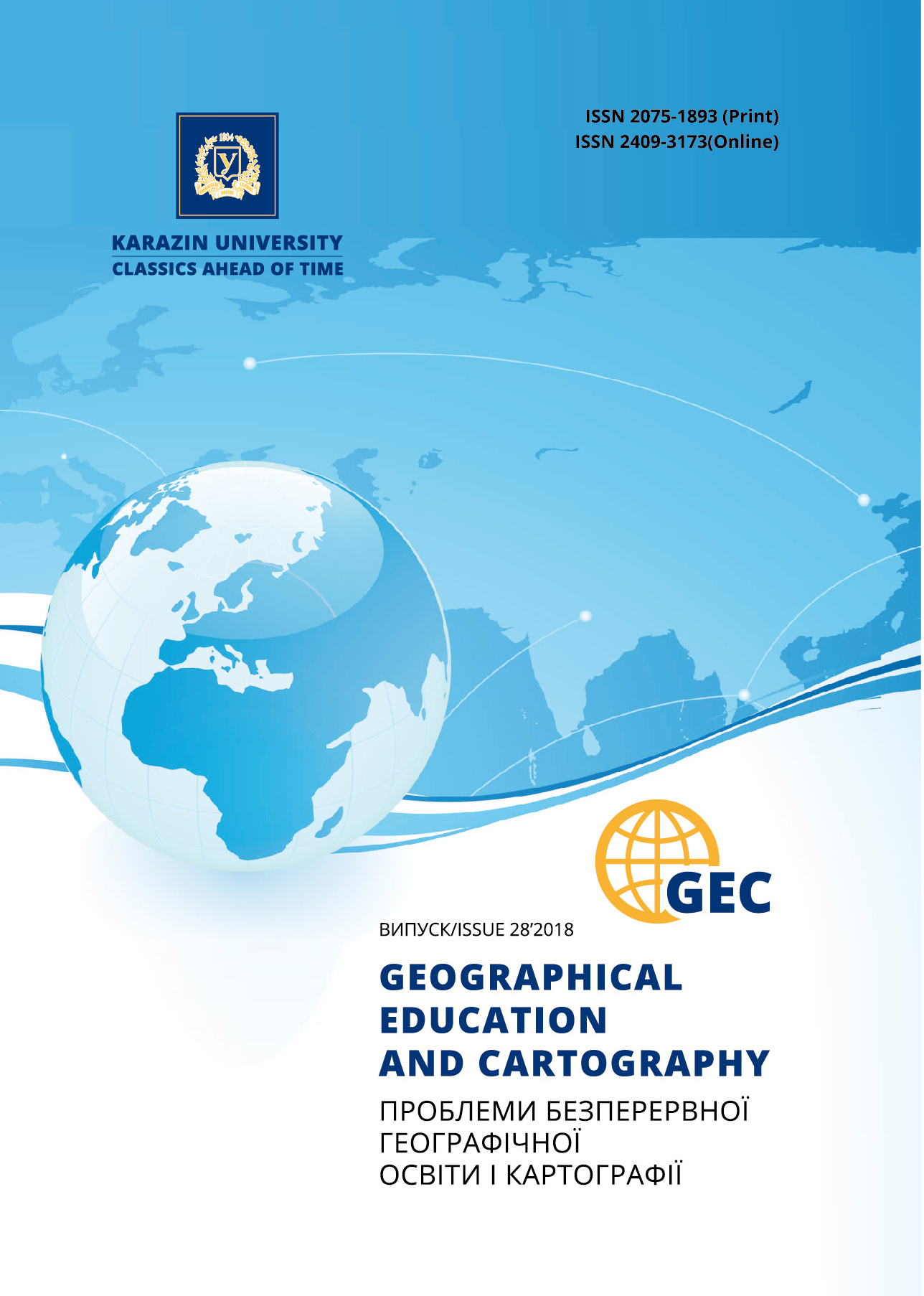Аналіз факторів просторової організації суспільства як інструмент підвищення ефективності географічної освіти та прикладної ролі географії
Анотація
У статті дано визначення факторів розвитку природних, демографічних, політичних, економічних і соціальних систем. Викладено варіанти класифікації факторів за різними критеріями. Основну увагу приділено аналізу просторових факторів, а також науково-технічному прогресу. Наведено класифікацію видів діяльності за факторами територіальної організації. Обґрунтовано необхідність вивчення усієї сукупності розглянутих факторів у системі загальної і вищої географічної освіти. Запропоновано враховувати їх при реалізації програм соціально-економічного розвитку регіонів і країн.
Завантаження
Посилання
Alayev, Je.B. (1983). Social’no-jekonomicheskaja geografija: ponjatijno-terminologicheskij slovar’ [Socio-economic geography: terminological dictionary]. Moskva: Mysl’, 364.
Babich, T.N., Koz’eva, I.A, Vertakova, Ju.V., Kuz’bozhev, Je.N. (2014). Prognozirovanie i planirovanie v uslovijah rynka [Forecasting and planning in market conditions]. Moskva: INFRA-M, 336.
Borovik, A. (2012). Osnovy i faktory, opredeljajushhie social’no-jekonomicheskoe razvitie regiona [Fundamentals and factors that determine the socio-economic development of the region]. Financial life, 3, 29-32.
Bunkina, M.K., Semenov, A.M., Semenov, V.A. (2000). Makrojekonomika [Macroeconomics]. Moskva: Delo i Servis, 312.
Burov, M.P. (2017). Regional’naja jekonomika i upravlenie territorial’nym razvitiem [Regional economy and management of territorial development]. Moskva: Dashkov i K, 446.
Vihanskij, O.S. (1995). Strategicheskoe upravlenie [Strategic management]. Moskva: MGU, 264.
Treshnikov, A.F., ed. in chief (1988). Geograficheskij jenciklopedicheskij slovar’. Ponjatija i terminy [Geographical encyclopedic dictionary. Concepts and terms]. Moskva: Sovetskaja jenciklopedija, 432.
Zygern-Korn, N.V. (2010). Regional‘naja diagnostika. Ch. 1 [Regional diagnostics. Part 1]. SPb: VVM, 49.
Kozlov, I.A. (2013). Jekonomicheskaja model’ Rossii XXI veka [Economic model of Russia of the XXI century]. Moskva: Kreativnaja jekonomika,559.
Lopatnikov, L.I. (1987). Jekonomiko-matematicheskij slovar’ [Economic and mathematical dictionary]. Moskva: Nauka, 510.
Plotkin M.Ja. (1977). Osnovy promyshlennogo proizvodstva [Basics of industrial production]. - Moskva: Vysshaja shkola, 312.
Limonov, L.Je., ed. (2017). Regional’naja jekonomika i prostranstvennoe razvitie. Т. 1 [Regional economy and spatial development. Vol. 1]. Мoskva: Jurajt, 319.
Limonov, L.Je., ed. (2017). Regional’naja jekonomika i prostranstvennoe razvitie. Т. 2 [Regional economy and spatial development. Vol. 1]. Мoskva: Jurajt, 367.
Harchenko, EV, Verkova, Ju.V. (2014). Gosudarstvennoe regulirovanie nacional’noj jekonomiki [State regulation of the national economy]. Moskva: KNORUS, 328.
Авторське право (c) 2018 О. Бурла

Цю роботу ліцензовано за Міжнародня ліцензія Creative Commons Attribution 4.0.





